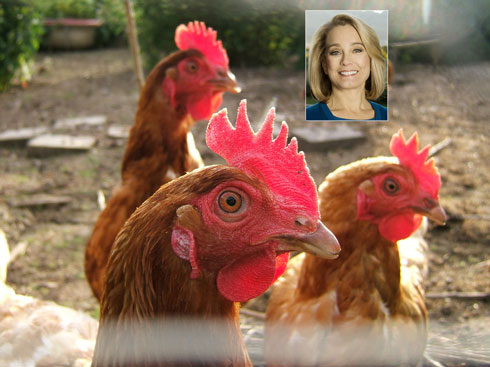Senate candidate Sue Lowden (R-NV) has been getting roasted (or perhaps even rotisseried) for her suggestion that bartering could lower health care costs and her reference to how her grandparents’ generation would pay doctors with a chicken. But, a close look at other media reports shows that Lowden is only one of many people to join the bandwagon over the last several years, with news organizations from the New York Times to the Fox Business Channel getting in on the action. Though of course, the use of barter does involve economic tradeoffs.
Here are some other examples of past news coverage about barter, pre-Lowden and her chickens:
⢠The Fox Business Network Happy Hour co-host Rebecca Diamond said in August 2009: “Hit or miss on whether bartering should be the way of the future for American health care. I say hit. I just don’t know what I would give in exchange for a doctor’s visit — oh god I should not have said that.” (via Nexis)
⢠CNN looked at the expanding use of private barter networks in June 2009, but noted a limitation: “[Entrepreneur Shawn Christian] would love to barter for prescription drugs, but can’t because there are no providers participating in his network.”
⢠Kaiser Health News reported in 2009: “Barter is little more than a stopgap solution for the uninsured. But with doctors, dentists, psychiatrists, chiropractors and even cosmetic surgeons offering their services, bartering is providing a temporary safety net of sorts for some workers who’ve lost their jobs and health coverage. And in some cases, people who have inadequate insurance are using barter to get services such as dental and vision benefits.”
⢠A 2008 article in the New York Times noted the growth of barter exchanges for various professional services, including medical care among other things — and how they are directly tied in with bad economic times, becoming a by-product of cash shortages.
⢠The Associated Press reported in 2009 on the increased use of exchange services during the bad economy: “Health care bartering has risen dramatically since the recession began, as people lose their health insurance and consumer spending drops, said Allen Zimmelman, a spokesman for the Bellevue, Wash.-based trade exchange ITEX Corp. ITEX Corp. has seen its health care business rise 45 percent over the past year. The exchange, which has 24,000 members, now fosters about $1 million a month in health care bartering.”
⢠In a 2005 article in the Jacksonville Times-Union, an economics profess at the University of North Florida pointed out that barter exchanges can act as a good way to find a new customers: “You may find people that nobody else is reaching … because they don’t necessarily have the cash to pay for things on the open market.”
Of course, the real question here is how effective barter transactions can become on a large scale, as opposed to minor, everyday human activities at the margins. After all, money was itself created over time as a medium of exchange thousands of years ago, precisely because of the inefficiencies and limits of barter.









